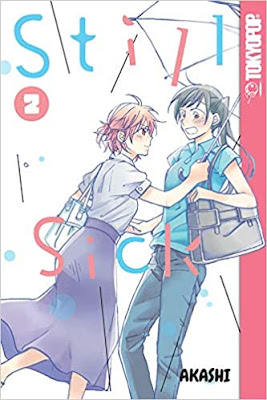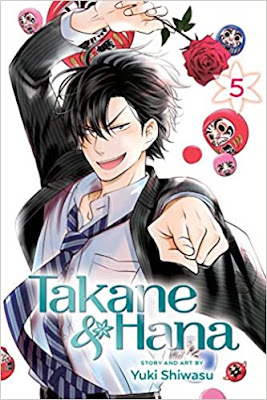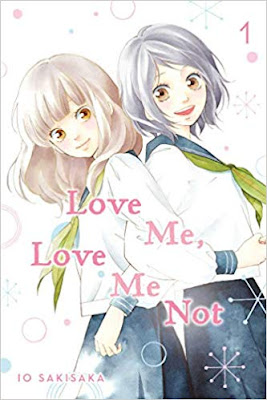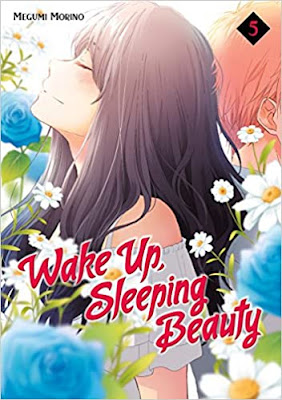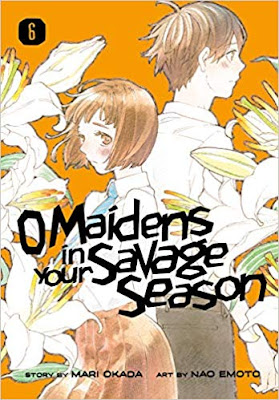"Missed it Monday" is the ongoing column where I review manga/anime that I didn't get to read/watch when they first came out.
Wish (Omnibus version) - 5/10 (*See below for full scoring rubric)
I wouldn't exactly say I'm a fan of manga supergroup CLAMP. I've tried to get into Cardcaptor Sakura a few times, but I'm not big on manga with little kids (tbh). However, I loved the art on their series Clover. I needed some stuff to read on a long and unexpected trip so I picked up the hefty omnibus of their series Wish (Dark Horse Publishing) because the art was very much my style - the super long, lean, "older" shoujo style that you don't see as much of today, at least not with what is getting translated into English.
The story itself is a pretty classic and tropey shoujo story: a young angel from heaven (Kohaku) is saved by a tall, reserved, but super handsome young man (28 year old Shuichiro). She promises him a wish, but he can't think of anything, so she decides to live with him until he comes up with one. Kohaku is supposed to be finding a missing angel, Hisui, who turns up having eloped with the son of Satan. The four of them share a house along with another demon and his assistants who frequently drop by as comic relief. Of course, it can't last, because God has other plans. But slowly, Kohaku and Shuichiro fall in love and Shuichiro's complex past an uncertain future come into focus. Will they or won't they end up together?
Monday, March 30, 2020
Friday, March 27, 2020
Carole & Tuesday Part 1 - a surprisingly bland story and characters with uneven racial and LGBTQ+ representation (Anime Review)
3/28/20 *after a series of comments/discussion
at the bottom of this post, I wanted to make revisions in my review of Part 1
of Carole & Tuesday to clarify my concerns with some racial and LGBTQ+
stereotypes that bothered me. The commenter helped me to better understand the
full context of the show (since I had only watched part 1 to this point) as
well as the content creation process and representation in the show. I was
still bothered and pulled out of the narrative by some choices that were made,
but my original review likely took a heavy handed approach in highlighting
these issues. I hope this revision is a more balanced and nuanced appraisal of
the effort put into this show as well as the feelings I experienced watching it. As always, this is just my experience and others will have very different ones and thus different opinions, that's what makes art art. I will try and mark my edits as I go through and
revise this review with brackets and asterisks [*].
Carole & Tuesday Part 1 - [*5/10] (see below for full scoring rubric)
I had really taken my
time even starting Carole & Tuesday (something about it had me skeptical -
maybe that it was on Netflix) and then it took me a really long time to watch
the first 13 episodes that comprise "part 1" because while I sort of
enjoyed each episode in the moment, I didn't feel compelled to whip through it
like other series.
But finally, amid too
much time on my hands during this work closure, I finally finished part 1. I
decided to review the series in two parts rather than as a single series, since
it was labeled part 1 and 2 (for some reason). I haven't seen part 2 yet [*so
there may be aspects of part 2 that put things in part 1 in a different
perspective.] I also found that writing
this review was very tough, because there was a lot to wade through with this
show. It ended up being a very long review, so I've put BOLD headings
along the way if that helps.
Wednesday, March 25, 2020
Still Sick volume 2 - well, at least one is an adult lesbian and that's something! (Manga Review)
Still Sick vol. 2 - 7/10 (*See full scoring rubric below)
Still Sick volume 2 (Tokyopop) shows some real promise for this series. It is a stronger overall volume than the first one, and we get a much clearer sense of each character's strengths and weaknesses, and thus the emotional trajectory we hope for them over the course of the series. It isn't perfect, but it is a series about two adult women finding themselves. They are clearly adults and at least one of them is written as such. It's refreshing to have a yuri series about adults in love. More josei yuri please!!!!
The overall plot of this volume concerns Shimizu and Maekawa's burgeoning friendship outside of the office as Shimizu supports Maekawa trying to get back into being a professional manga artist. Volume 1 ended with a kiss from Maekawa that was supposedly meant only to tease Shimizu, but it clearly confused Shimizu. In this volume, they continue exploring this meaning, Maekawa tries working on an original series, and we learn a lot about their two personalities.
Still Sick volume 2 (Tokyopop) shows some real promise for this series. It is a stronger overall volume than the first one, and we get a much clearer sense of each character's strengths and weaknesses, and thus the emotional trajectory we hope for them over the course of the series. It isn't perfect, but it is a series about two adult women finding themselves. They are clearly adults and at least one of them is written as such. It's refreshing to have a yuri series about adults in love. More josei yuri please!!!!
The overall plot of this volume concerns Shimizu and Maekawa's burgeoning friendship outside of the office as Shimizu supports Maekawa trying to get back into being a professional manga artist. Volume 1 ended with a kiss from Maekawa that was supposedly meant only to tease Shimizu, but it clearly confused Shimizu. In this volume, they continue exploring this meaning, Maekawa tries working on an original series, and we learn a lot about their two personalities.
Monday, March 23, 2020
Missed it Monday - Takane & Hana volume 5 (Manga Review)
"Missed it Monday" is the regular column where I review manga/anime that I didn't get to read/watch when they first came out.
Takane & Hana vol. 5 - 5/10 (*See full scoring rubric below)
I must admit, I was starting to get bored with Takane & Hana as I was reading volume 5 (Shojo Beat/Viz). By now, we're familiar with their shtick. It's fine, but it is very broad comedy in a very light romance. I do like Takane's tsundere-meets-arrogant jack ass personality against her very strong, self-assured, but still very caring personality. However, what I wasn't expecting was a random transgender character from Takane's past who got introduced late in this volume.
So for the sake of brevity with the main review: The art is simple and broad like the comedy. I still have problems with an adult (Takane) being in an arranged marriage arrangement (because they aren't yet married) with a high-schooler (Hana). But nothing romantic is happening, and at least they are doing it with her family's knowledge so it's a bit less icky for that reason. If you like very very broad romantic comedies and the stuff above doesn't bother you, then Takane & Hana is sure to please. Yadda, yadda, yadda, I feel like every review I write of this series says the same thing. So let's talk about Rino, a transgender woman who appears in this volume.
Takane & Hana vol. 5 - 5/10 (*See full scoring rubric below)
I must admit, I was starting to get bored with Takane & Hana as I was reading volume 5 (Shojo Beat/Viz). By now, we're familiar with their shtick. It's fine, but it is very broad comedy in a very light romance. I do like Takane's tsundere-meets-arrogant jack ass personality against her very strong, self-assured, but still very caring personality. However, what I wasn't expecting was a random transgender character from Takane's past who got introduced late in this volume.
So for the sake of brevity with the main review: The art is simple and broad like the comedy. I still have problems with an adult (Takane) being in an arranged marriage arrangement (because they aren't yet married) with a high-schooler (Hana). But nothing romantic is happening, and at least they are doing it with her family's knowledge so it's a bit less icky for that reason. If you like very very broad romantic comedies and the stuff above doesn't bother you, then Takane & Hana is sure to please. Yadda, yadda, yadda, I feel like every review I write of this series says the same thing. So let's talk about Rino, a transgender woman who appears in this volume.
Friday, March 20, 2020
Love Me, Love Me Not volume 1 too cliche'd or just enough? (Manga Review)
Love Me, Love Me Not vol. 1 - 8/10 (*See full scoring rubric below)
It is my distinct pleasure to bring you the start of a new Io Sakisaka (Ao Haru Ride, Strobe Edge) series with Love Me, Love Me Not volume 1 (Shojo Beat/Viz). Ao Haru Ride in both manga and anime form is simply one of the greatest shojo series ever. Yes, I really mean ever. So my anticipation was great for her new series, and thankfully, volume 1 didn't let me down.
Is Love Me, Love Me Not vol. 1 perfect? No, but what little doubt I still have is easily assuaged by my trust in Sakisaka-sensei as a creator. Ao Haru Ride is the perfect example of a series in which there are no big dramatic elements, no dramatic characters, very little that actually happens, and yet is so deeply moving, heartfelt, engaging, and sympathetic that you just want to keep living forever with the characters. Love Me, Love Me Not has a very similar feel already. The biggest question mark for me is where does it go from the big reveal at the end of volume 1.
It is my distinct pleasure to bring you the start of a new Io Sakisaka (Ao Haru Ride, Strobe Edge) series with Love Me, Love Me Not volume 1 (Shojo Beat/Viz). Ao Haru Ride in both manga and anime form is simply one of the greatest shojo series ever. Yes, I really mean ever. So my anticipation was great for her new series, and thankfully, volume 1 didn't let me down.
Is Love Me, Love Me Not vol. 1 perfect? No, but what little doubt I still have is easily assuaged by my trust in Sakisaka-sensei as a creator. Ao Haru Ride is the perfect example of a series in which there are no big dramatic elements, no dramatic characters, very little that actually happens, and yet is so deeply moving, heartfelt, engaging, and sympathetic that you just want to keep living forever with the characters. Love Me, Love Me Not has a very similar feel already. The biggest question mark for me is where does it go from the big reveal at the end of volume 1.
Wednesday, March 18, 2020
Daytime Shooting star volume 5 - what is Shishio thinking?! (Manga Review)
Daytime Shooting Star volume 5 - 5/10 (*see full scoring rubric below)
There are two saving graces with this series, 1) a regular reader of this blog assures me it will end in a satisfying and appropriate way and 2) in volume 5, the mangaka, Mika Yamamori, seems to acknowledge how problematic Shishio's behavior is and that suggests that she is aware and going to course correct. With that in mind, although I can't ignore the problematic aspects of this series/volume, I will try and relax a bit in my vehemence. On to the review of Daytime Shooting Star, volume 5 (Shojo Beat/Viz).
It's time for the school festival and Suzume's classroom is putting on a classic cafe with the girls in maid costumes and the boys in tuxes. Suzume's uncle brings Shishio, her teacher, into the cafe. Suzume is about to (nervously) seat him when Mamura takes over, and coldly at that.
There are two saving graces with this series, 1) a regular reader of this blog assures me it will end in a satisfying and appropriate way and 2) in volume 5, the mangaka, Mika Yamamori, seems to acknowledge how problematic Shishio's behavior is and that suggests that she is aware and going to course correct. With that in mind, although I can't ignore the problematic aspects of this series/volume, I will try and relax a bit in my vehemence. On to the review of Daytime Shooting Star, volume 5 (Shojo Beat/Viz).
It's time for the school festival and Suzume's classroom is putting on a classic cafe with the girls in maid costumes and the boys in tuxes. Suzume's uncle brings Shishio, her teacher, into the cafe. Suzume is about to (nervously) seat him when Mamura takes over, and coldly at that.
Monday, March 16, 2020
Missed it Monday - Wake Up, Sleeping Beauty volume 5 (Manga Review)
"Missed it Monday" is the ongoing column where I review manga/anime that I didn't get a chance to read/watch when they first came out.
Wake Up, Sleeping Beauty vol. 5 - 8/10 (*See full scoring rubric below)
I was already really liking Wake Up, Sleeping Beauty, but volume 5 (Kodansha Comics) cemented it for me. I think this was probably the strongest volume yet in the series with extremely powerful writing alternating between heartbreak, heartwarming, cute, intense, sad, warm, you name the emotion and this volume had it. And even though it had some slightly over-dramatic setups, they all worked as part of the whole and started pulling a bunch of threads together in some very interesting ways. Needless to say, I'm super excited for the concluding volume (volume 6).
Wake Up, Sleeping Beauty vol. 5 - 8/10 (*See full scoring rubric below)
I was already really liking Wake Up, Sleeping Beauty, but volume 5 (Kodansha Comics) cemented it for me. I think this was probably the strongest volume yet in the series with extremely powerful writing alternating between heartbreak, heartwarming, cute, intense, sad, warm, you name the emotion and this volume had it. And even though it had some slightly over-dramatic setups, they all worked as part of the whole and started pulling a bunch of threads together in some very interesting ways. Needless to say, I'm super excited for the concluding volume (volume 6).
Saturday, March 14, 2020
O Maidens in Your Savage Season volume 6 was polar extremes (Manga Review)
O Maidens in Your Savage Season vol. 6 - 6.5/10 (*see full scoring rubric below)
I’m not sure where O Maidens in Your Savage Season is going as a series. In the first volume, it really felt like a fairly realistic, but comical, examination of puberty from the female perspective. However, by volume 6 (Kodansha Comics), the series is struggling to balance that realism against some very intense, and not altogether believable, drama. And it isn't so much the drama that's the issue, as the lack of story or authorial critique of that drama that concerns me. What message are we to be taking from this?
I’m not sure where O Maidens in Your Savage Season is going as a series. In the first volume, it really felt like a fairly realistic, but comical, examination of puberty from the female perspective. However, by volume 6 (Kodansha Comics), the series is struggling to balance that realism against some very intense, and not altogether believable, drama. And it isn't so much the drama that's the issue, as the lack of story or authorial critique of that drama that concerns me. What message are we to be taking from this?
In volume 6, Kasuzu and Izumi have finally started dating. They have fun
together on the way to school, but are super awkward with each other when she
comes over to his house. I totally remember the feeling of not knowing what I
should do once I started dating my high-school girlfriend. This scene was
perfectly depicted, right down to each of them thinking that theirs are the
hands that are sweating when they hold each other’s.
Wednesday, March 11, 2020
Shortcake Cake volume 7 inches things forward - but where's Rei? (Manga Review)
Shortcake Cake vol. 7 - 5/10 (*see full scoring rubric below)
Shortcake Cake vol. 7 (Shojo Beat/Viz) wasn't bad, nor was it good. It was just sort of there. Given that the middle third of it was consumed with the already cute Ten feeling like she needed to pretty herself up in a way that wasn't who she normally was, I ended up being more disappointed in this volume than just bored.
Ten has just confessed to Riku. But instead of waiting for an answer from Riku, she thinks he no longer likes her and declares that she'll make him come around. He, either being sweet or sadistic, plays along even though he's still madly in love with her. She then goes through a period of trying to make herself look more desirable (ughhh), which is unfortunate because the beany-hat wearing Ten from the early volumes was totally cute as she was.
Shortcake Cake vol. 7 (Shojo Beat/Viz) wasn't bad, nor was it good. It was just sort of there. Given that the middle third of it was consumed with the already cute Ten feeling like she needed to pretty herself up in a way that wasn't who she normally was, I ended up being more disappointed in this volume than just bored.
Ten has just confessed to Riku. But instead of waiting for an answer from Riku, she thinks he no longer likes her and declares that she'll make him come around. He, either being sweet or sadistic, plays along even though he's still madly in love with her. She then goes through a period of trying to make herself look more desirable (ughhh), which is unfortunate because the beany-hat wearing Ten from the early volumes was totally cute as she was.
Monday, March 9, 2020
Missed it Monday - Love at Fourteen volume 7 (Manga Review)
"Missed it Monday" is the ongoing column where I review manga/anime that I didn't get to read/watch when they first came out.
Love at Fourteen vol. 7 - 6.5/10 (*see full scoring rubric below)
After the mixed bag that was volume 6 (great Kanata/Kazuki relationship stuff, problematic Nagai/Hinohara-sensei relationship stuff), Love at Fourteen volume 7 (Yen Press) takes a mostly calmer, lower-key stance. At least, until it doesn't. But that big emotional kick comes as Hinohara-sensei appears to finally be wrestling with just how wrong it is that she feels romantically attracted to a fourteen-year-old.
The first major story portion covers the school newspaper researching ghost stories around the school. It's light-hearted, but we get to see an interesting side of Kanata. She's actually pretty scared but won't let on for a while, instead acting quite intensely angry towards Kazuki. This level of intensity is new, but also makes sense for a teen and it's nice to see another facet of her personality (and how they resolve it together).
Love at Fourteen vol. 7 - 6.5/10 (*see full scoring rubric below)
After the mixed bag that was volume 6 (great Kanata/Kazuki relationship stuff, problematic Nagai/Hinohara-sensei relationship stuff), Love at Fourteen volume 7 (Yen Press) takes a mostly calmer, lower-key stance. At least, until it doesn't. But that big emotional kick comes as Hinohara-sensei appears to finally be wrestling with just how wrong it is that she feels romantically attracted to a fourteen-year-old.
The first major story portion covers the school newspaper researching ghost stories around the school. It's light-hearted, but we get to see an interesting side of Kanata. She's actually pretty scared but won't let on for a while, instead acting quite intensely angry towards Kazuki. This level of intensity is new, but also makes sense for a teen and it's nice to see another facet of her personality (and how they resolve it together).
Friday, March 6, 2020
My Androgynous Boyfriend volume 1 wasn't what I was expecting (Manga Review)
My Androgynous Boyfriend Vol. 1 - 6/10 (*see full scoring rubric below)
On first read, I was disappointed with My Androgynous Boyfriend vol. 1 (Seven Seas). It didn't in any way conform to my hopes or expectations given its title. But after knowing that, I read it again.
On second read, reading it for what it was (instead of what I wanted it to be), I found it to be enjoyable, cute, and sweet. It still wasn't what I hoped, but it wasn't bad either. That's the problem with expectations. It's also the problem when you are desperately searching for representation and mirrors in the world. It's hard not to place all your hopes and expectations into someone else's work and expect it to be what you need, rather than what they intended.
I wanted My Androgynous Boyfriend to really focus on a gender non-conforming individual and dig into the inner and social complexities of gender non-conformity and/or the non-binary experience. In many ways, I was hoping for a dramatic piece that would be a combination of the tone of "Our Dreams at Dusk" and the non-binary character Ciel from Sophie Labelle's comic "Assigned Male." I wanted to see that representation, to gain insight into their experience, learn from it, and find parts of my own experience mirrored in it.
On first read, I was disappointed with My Androgynous Boyfriend vol. 1 (Seven Seas). It didn't in any way conform to my hopes or expectations given its title. But after knowing that, I read it again.
On second read, reading it for what it was (instead of what I wanted it to be), I found it to be enjoyable, cute, and sweet. It still wasn't what I hoped, but it wasn't bad either. That's the problem with expectations. It's also the problem when you are desperately searching for representation and mirrors in the world. It's hard not to place all your hopes and expectations into someone else's work and expect it to be what you need, rather than what they intended.
I wanted My Androgynous Boyfriend to really focus on a gender non-conforming individual and dig into the inner and social complexities of gender non-conformity and/or the non-binary experience. In many ways, I was hoping for a dramatic piece that would be a combination of the tone of "Our Dreams at Dusk" and the non-binary character Ciel from Sophie Labelle's comic "Assigned Male." I wanted to see that representation, to gain insight into their experience, learn from it, and find parts of my own experience mirrored in it.
Wednesday, March 4, 2020
Our Wonderful Days volume 2 - who's it for really? (Manga Review)
Our Wonderful Days vol. 2 - 5/10 (*see full scoring rubric below)
Our Wonderful Days volume 2 (Seven Seas) really left me wondering who the target audience is. Is it for girls and women who want to explore the intimate friendships and relationships that are possible between women or is it for boys and men who like to think about cute girls getting together?
In many ways, the closest analog I can find for it is the anime Minami-ke (I haven't read the manga, so I can only speak to the show). The Minami-ke manga is a seinen manga, and the show features a trio of sisters and their female friends, with only the occasional male character. It's one of those shows about cute girls doing cute things cutely. There's no real plot to it, sort of a slice of life, but with an underlying titillating tension of knowing that you are objectifying and sexualizing the girls.
Our Wonderful Days volume 2 (Seven Seas) really left me wondering who the target audience is. Is it for girls and women who want to explore the intimate friendships and relationships that are possible between women or is it for boys and men who like to think about cute girls getting together?
In many ways, the closest analog I can find for it is the anime Minami-ke (I haven't read the manga, so I can only speak to the show). The Minami-ke manga is a seinen manga, and the show features a trio of sisters and their female friends, with only the occasional male character. It's one of those shows about cute girls doing cute things cutely. There's no real plot to it, sort of a slice of life, but with an underlying titillating tension of knowing that you are objectifying and sexualizing the girls.
Monday, March 2, 2020
Missed it Monday - Love at Fourteen volume 6 (Manga Review)
Missed it Monday is the ongoing column where I review manga/anime that I didn't read or watch when they first came out.
Love at Fourteen vol. 6 - 5/10 (*see full scoring rubric at the end)
Love at Fourteen volume 6 (Yen Press) continues the series' mix of amazingly cute relationships with some problematic elements. It has some really strong moments when it focuses on the main couple of Kanata and Kazuki. But there is a pretty concerning set of events between the teacher, Hinohara-sensei, and her student, Nagai, that detract from the volume in my mind.
Volume 6 is situated around two main events, the class trip and the school cultural festival. On the class trip, the girls are all talking about the boys, who's confessed to whom, and all that stuff. They assume that the "mature" Kanata has lots of love experience, but she's still pretty naive. On the other side, the boys are all talking about how awesome it is to see the girls in their pajamas and that sort of stuff. This gets Kazuki's mind spinning about how much he wants to move things along with Kanata.
Love at Fourteen vol. 6 - 5/10 (*see full scoring rubric at the end)
Love at Fourteen volume 6 (Yen Press) continues the series' mix of amazingly cute relationships with some problematic elements. It has some really strong moments when it focuses on the main couple of Kanata and Kazuki. But there is a pretty concerning set of events between the teacher, Hinohara-sensei, and her student, Nagai, that detract from the volume in my mind.
Volume 6 is situated around two main events, the class trip and the school cultural festival. On the class trip, the girls are all talking about the boys, who's confessed to whom, and all that stuff. They assume that the "mature" Kanata has lots of love experience, but she's still pretty naive. On the other side, the boys are all talking about how awesome it is to see the girls in their pajamas and that sort of stuff. This gets Kazuki's mind spinning about how much he wants to move things along with Kanata.
Subscribe to:
Posts (Atom)



